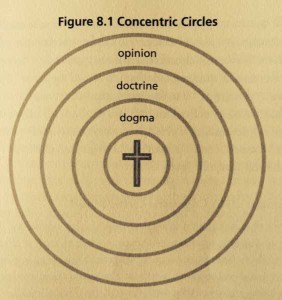Unity in the Body
At Emmaus Road Church in Fort Collins, we’ll be studying the book of Galatians and it’s call to unity over the next several weeks. Our goal is to allow this letter to speak into our lives and specific circumstances.
The New Testament book of Galatians was written by a person named the Apostle Paul to the church in the region of Galatia. Reading Paul’s letter to the Christians in Galatia is a bit like reading someone else’s email. You are stepping into their world.
In ancient culture, a letter was important because it served as a substitute for the personal presence of the author. When you read letters in the Bible, you are getting a glimpse into the relationship between the author and the letter’s recipients, and entering an established context. Many times, a letter is the continuation of a conversation that started in person. We must also realize that every letter serves a purpose. When you read Galatians (and other letters of Paul), the letter is trying to solve or address a problem. You can never understand the letters if you don’t know what problem they are trying to solve!
Calling For Unity In The Body Of Christ
So what’s the problem being addressed in Galatians? Paul had shared the Gospel with the people of Galatia, but now there is an alternative gospel being presented and apparently the Galatians were falling for it.
To help you understand the nature of this alternative gospel, consider this illustration.
A builder comes to a small town in Alabama in the 1950’s with plans to build a community center. The builder wants to create a facility where all people, regardless of race, gender, or income could gather and he wants the design of the physical space to reflect this openness. Designs are dreamed-up, blue prints are made and the foundation of the building is laid. At that point, the builder is called out of town to take care of another urgent need. He is confident he can leave because the foundation of the building has already been laid.
After a little while, though, he gets word back that new builders have come in and changed the plans. Instead of a community center that is open and will welcome people of all races, these builders have separated the building into two areas, each with it’s own door. Now there are two gathering spaces and two main doors – one area for white people, the other for black people and other minorities. Some of the locals are relieved because they didn’t see how the one community center would ever work. Others are wondering why the original plans aren’t being carried out. The new builders respond to their dissenters by saying, “That original builder had some funny ideas of how things should be. He didn’t really have authority to make those kinds of plans. We have the real authority and this is how the building must be built.”
Paul often refers to himself as a builder, a people builder, and this is precisely the situation he is facing in Galatia. He laid the foundation of the Gospel, which, by the way, literally means “good news.” The good news according to Paul is there is one God, the world’s creator, and this one God has now revealed his long-awaited plan for the world. The unveiling took place in a Jew named Jesus; He is the Jewish Messiah, a king-to-end-all-kings. Jesus was executed by the Romans and then raised from the dead. According to Paul, Jesus’ death and resurrection means that God is now building a new, single family with no divisions or separate races. Jews believed that when the Messiah came he would be Lord of all the world; so, Paul argues, he’d have to have just one family. And, though this family is the fulfillment of what this God had promised to the Jews, the remarkable thing is that, because of Jesus, you don’t have to be a Jew to belong. The God of Israel wants to be known as ‘father’ by the whole world.
The Message Against Christian Unity
This “one family of God” message made the Gospel of Jesus Christ scandalous! It still does. Which is why other people-builders came in and said, “The original builder had some funny ideas. Plus, he doesn’t really have the authority to make a claim like that. We are the real builders who have proper authority.”
Their message was this: If a Gentile (non-Jewish person) wants to receive the promises of God, they have to be circumcised, adopt Jewish practices, and become a Jew. Their message could be boiled down to “unity comes through uniformity.” The Galatians started to believe it! Even though Paul had laid the foundation for unity through God’s new single family, they started to believe the message of the other people-builders.
Paul makes it clear that believing this alternative gospel has dangerous consequences.
It throws them into confusion (vs. 7), perverts the true Gospel (vs. 7), and lead’s to God’s curse (8-9)!
The Gospel is scandalous because of who it let’s it, not who it keeps out.
Drawing Lines
In today’s cultural landscape it is very easy to draw lines around ourselves and our groups. We want to keep good track of the things the separate us so we can live with the illusion of unity among people who are just like us. We like to come up with things that will get you “in” the crowd or keep you “out” of the crowd.
We tend to draw lines based on race, income, education, political persuasion, theological views, and doctrinal distinctions – just to name a few.
Paul’s point in the opening chapter of Galatians is that every time you draw false lines to determine who is “in” and who is “out” it is a conversion in reverse and perversion of the true Gospel. In fact, in light of what was going on in Galatia in the first century, I what you to consider the irony of a bunch of modern-day Gentiles sitting around and deciding who is in and who is out.
This picture recently came across my Facebook new feed. I think it speaks volumes:
I wonder what lines you may be drawing all around you that Jesus is trying to erase?
With all this unity and erasing lines, how are we to determine what is true? Doesn’t the Gospel draw lines around belief, action, and thought? If the Gospel does draw lines, how are we to know what lines are being drawn and what lines are being erased?
If the line you are drawing separates you from other people because you perceived yourself to be better or right than Jesus is trying to erase that line. The whole point of the Gospel is that we all come to the feet of Jesus as sinners.
When it comes to belief, there are some points of discernment. This is a very helpful article from Greg Boyd. I’ll try to summarize it here.
With all the chatter on social media, people flying ideas all over the place and condensing thought to 140 characters on twitter, how should we think about our unity in Christ? How do you make any sense of the noise? One helpful way might be to think about theological belief was three concentric circles.
At the center of our faith is Jesus Christ. We find all our unity in Him. He is the full revelation of God. We understand God’s character in Christ. Jesus embodies God’s love for us. Jesus embodies and demonstrates the love we are to have for one another. The center of our theological belief must be Jesus.
The next circle is Christian Dogma. Since our theology must always be worked out in community, the dogma are the things consistent with historic orthodox Christian belief. These are outlined for us by the Apostles Creed or the Nicene Creed and includes things like Jesus is fully God and fully human, God exists as Trinity, God is creator, and Christ will return.
The second circle is doctrine. Doctrine is interpretation of dogma. For example, there are many different beliefs about what it means to say God is creator. Some Christians hold to a literal six day creation. Others who see nothing wrong with God taking millions of years to form earth and it’s life. You also have a whole bunch of interpretations regarding Christ’s return. Rapture or not. Destruction or restoration. Pie in the sky when you die or physical re-creation. Denominations draw doctrinal lines on some things, but not all things.
The third circle is opinion. Opinion is interpretation of the doctrine. It is a personal wrestling with scripture to make sense of things and consists of beliefs that, historically haven’t been held by a group of people together.
Here is Greg Boyd on the freedom and discernment this approach to theology affords us,
“This allows people to adjust their beliefs to accommodate their ongoing intellectual and spiritual development while at the same time grounding them in a life-giving relationship with Christ. It’s flexibility allows people, and even encourages them, to fearlessly and honestly wrestle with whatever issues come their way and, so long as their life remains anchored in Christ, to do so in a non-defensive and objective way. For the same reason, this model empowers Christians to discuss and debate issues with other Christians or with nonbelievers in loving, non-defensive, and rational ways.” -Greg Boyd, reknew.org
Let’s walk in unity based on our faith in Christ!
To learn more about Galatians and the call to unity in the Body of Christ, click on the resources below from Emmaus Road Church, a church in Fort Collins.
Download the Sermon Outline
Download the Sermon Discussion Guide
Listen to the Podcast
[/column]


